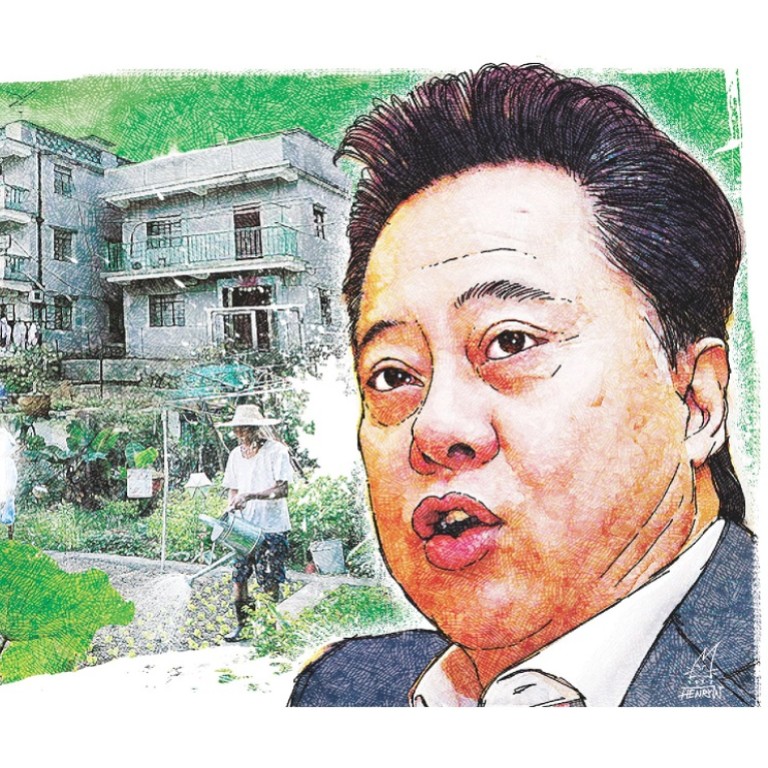
Hau Chi-keung: Hong Kong's straight-talking but controversial rural leader
Hau Chi-keung defends his confrontation with an old woman who won compensation from him, and he denies having ties with triads
Sheung Shui rural leader Hau Chi-keung is no stranger to controversy and adverse headlines. He has been rumoured to have ties with triads and most recently made the news over a land spat, in which he was reprimanded by a judge and accused of bullying an old lady.
The indigenous village leader said it all had to do with his character.
"I've always said what I meant, done what I thought was right … I'm not stubborn, I'm just brutally honest," he said, sitting in his office among tables and shelves full of thank you plaques and trophies. "As a person in my position, I do what I can ... for the community."
Hau, 59, made headlines most recently for losing a court case to 85-year-old Lau Oi-kiu, who was awarded HK$1.41 million in compensation for being driven off her farmland. A court ordered him and a property agent to compensate Lau for dumping waste on her land in Ho Sheung Heung, Sheung Shui.
But it was what happened afterwards that caused outrage, and saw Hau painted as a heartless bully.
A day after the court judgment, Hau called the police and had the elderly woman arrested for common assault after she jabbed a finger in his face.
"Just because she's an old woman, is it OK to hit someone? What kind of fairness is that?" asked Hau. "Maybe you didn't see - she had her children there that day. She wasn't alone and helpless as was portrayed ... I wasn't the bully there."
Hau insisted that he wasn't using his position of power to persecute the weak, but that he was too "hands-on" in community affairs.
Apart from being a man with land, property and businesses both in Hong Kong and on the mainland, Hau has also been village leader of Ho Sheung Heung since 1999 and chairman of the Sheung Shui Rural Committee since 2007.
But contrary to public belief, Hau's rise to power did not come through inheritance.
"People say I was born with a silver spoon in my mouth. Well, I started working full-time when I was 13. I'm not ashamed to say that - I only graduated from primary school," he said.
Hau, born in Ho Sheung Heung in 1956, said that despite being an indigenous Hongkonger, his grandfather left the family no land.
"Of course I started working because I had to. Every day in a ship machine shop from 8.30am to 6pm. Then overtime after dinner until 11pm. It was HK$270 a month - for four years," he said of his first job.
In 1979, Hau left Hong Kong for Chicago, where he spent five years working and learning English. He opened the first sit-down Chinese restaurant in Chicago's Harlem district.
Hau then went to Europe for a year before coming back to Hong Kong.
"Back then, the job market for us indigenous villagers wasn't good - it was either farming, the civil service or going overseas. I chose overseas," he said. "It was to learn and see ... and I saw that in the US, Chinese people were picked on and bullied. It was hard work, but I learned a lot during my time abroad. It taught me determination."
He came back and earned his first "pot of gold" in the seafood business. He later moved on to real estate and restaurants, both in Hong Kong and Shenzhen.
Hau said he ran for the post of Ho Sheung Heung village head in 1997 but lost, only to win two years later. In 2007, he became head of the Sheung Shui Rural Committee. He is also a member of the Liberal Party and a district councillor.
Hau said that in almost 20 years as a community leader, he had met a lot of people - including triad members. However, he denied having any ties with them.
"I'm 100 per cent not a triad member. Does knowing them mean I'm one of them? If so, all Hong Kong's policemen are triad members," he scoffed. "With so many years doing work in the community, who do I not know?
"I've had to break up fights and deal with students being bullied, and sometimes that involves triad-affiliated people. In this job, you meet and interact with different people."
Hau said he had no plans yet to quit his posts.
"I've never really thought of stepping down. I think I'll do this until I have to retire, and I haven't decided when that will be," he said. "But I have no plans to go further and try for a Legislative Council seat."
With three grown children and two grandchildren, Hau said his family often told him "not to stick my nose in other people's business". But he said it was part of his responsibility.
"This row with the old lady - I was just trying to help," he said, adding that he had promised the government to help return the land to its former state.
While Hau was previously adamant that he would appeal against the court judgment, he told the on Saturday that after discussion with family members and lawyers, he had decided not to appeal.
"If we appeal and win, it'll look even more like I'm bullying the old lady," he said.
Hau remained supportive of government plans for development in the northern New Territories, which have prompted intense controversy.
"Development is natural. I support the government if it is building necessary infrastructure like roads, transport networks and hospitals," he said, adding that this would benefit locals.
On the housing shortage in Hong Kong, Hau said: "Of course I'm supportive of the government building more housing and giving those who can afford it a chance to buy a property."
